Introduction & Analysis
This collection of open-source English-language news articles published over the past week highlights significant events and issues concerning Myanmar. They present a snapshot of the safety and security landscape in Myanmar.
Armed Conflict and Military Operations:
- Fierce fighting is ongoing in various regions, including Rakhine State, Sagaing Region, and near the Myanmar-Thai border. The Arakan Army (AA) is actively gaining ground in Rakhine and Bago regions, seizing key checkpoints from the junta. In Sagaing, guerrilla-style assaults by resistance forces are common, and the junta responds with operations that sometimes employ scorched-earth tactics. Clashes have also been reported in Shan State.
- Junta forces are conducting airstrikes and artillery bombardments in response to resistance activities. These attacks are endangering civilians and have caused significant casualties. For instance, a junta airstrike on a monastery and market reportedly killed 41 civilians. Airstrikes have also hit TNLA-held towns, resulting in the deaths of monks and civilians. The TNLA has warned civilians to be vigilant against aerial attacks in areas with no active fighting.
- Resistance groups are also engaging in offensive operations, capturing junta bases and seizing weapons. The Kachin Independence Army (KIA) and its allies are attacking junta bases in Kachin State. Anti-junta forces ambushed a junta column in Sagaing, capturing 30 soldiers. The Karen National Liberation Army (KNLA) and its allies captured a junta military base near the Thai border, with previous clashes involving KNLA snipers killing regime soldiers.
- The conflict has led to territorial gains by resistance forces, particularly the AA in Rakhine State, which controls most of the state except for the capital Sittwe, Kyaukphyu, and Manaung. Despite junta efforts to counter these offensives, their territorial gains remain limited and under constant threat.
Forced Conscription:
- The junta is enforcing mandatory military service, and there are reports of blackmailing parents to ensure the return of their children for conscription. Families face threats of prosecution or having relatives taken hostage if potential conscripts cannot be found.
- Resistance groups are also reportedly engaging in conscription. The TNLA has plans for conscription in Mogok Town, alarming civilians. Residents in Mandalay Region also reported that the TNLA is forcing conscription. The Pa-O National Organisation (PNO) militia is also enforcing military recruitment in Shan State, straining local communities.
International Involvement and Aid:
- Hundreds of CSOs have demanded the removal of the UN Special Envoy for Myanmar due to concerns over her connections to Chinese state-owned companies, raising questions about impartiality.
- A UN expert has stated that Myanmar faces "untold" suffering due to the US aid "betrayal," although the specifics of this betrayal are not detailed in these excerpts. US aid cuts are affecting refugee camp clinics, leading to staff shortages and reduced services. The WFP is also set to cut food aid to 1 million people in Myanmar.
Conflict
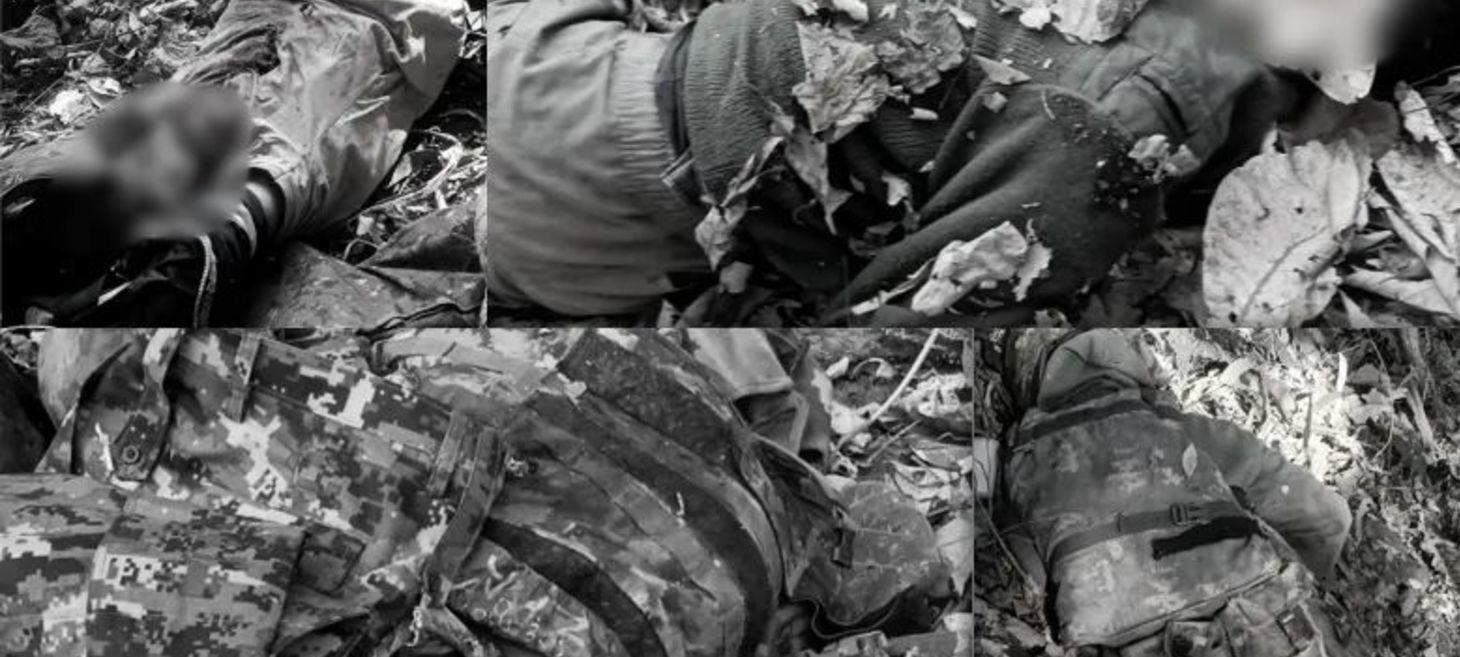
Fierce Fighting Outside Katha Town in Sagaing Region - Burma News International
Fierce fighting erupted outside the junta-held Katha Town in Sagaing Region on the morning of March 15, 2025, when approximately 150 junta soldiers from Light Infantry Battalion (LIB) 309 advanced from Katha Town into resistance-held areas of Katha Township. The clash occurred near the Natyaetwin-Pinmalut intersection, about 6.5 km from the LIB 309 base, with the junta firing artillery into the combat zone. The fighting, described as the heaviest in the area so far, lasted until around 2:00 PM on March 16, after which the junta soldiers retreated to their base. Two resistance fighters were killed, and the bodies of four junta soldiers were found, while resistance forces captured 29 junta soldiers and seized weapons. There were no civilian casualties as locals are accustomed to evacuating during such events, although obtaining information from Katha Township is difficult due to the junta cutting off communication lines in July 2024. Katha Town is strategically important, located on the west bank of the Ayeyarwady River and bordering Kachin State, with a population of about 160,000 according to the 2014 census.
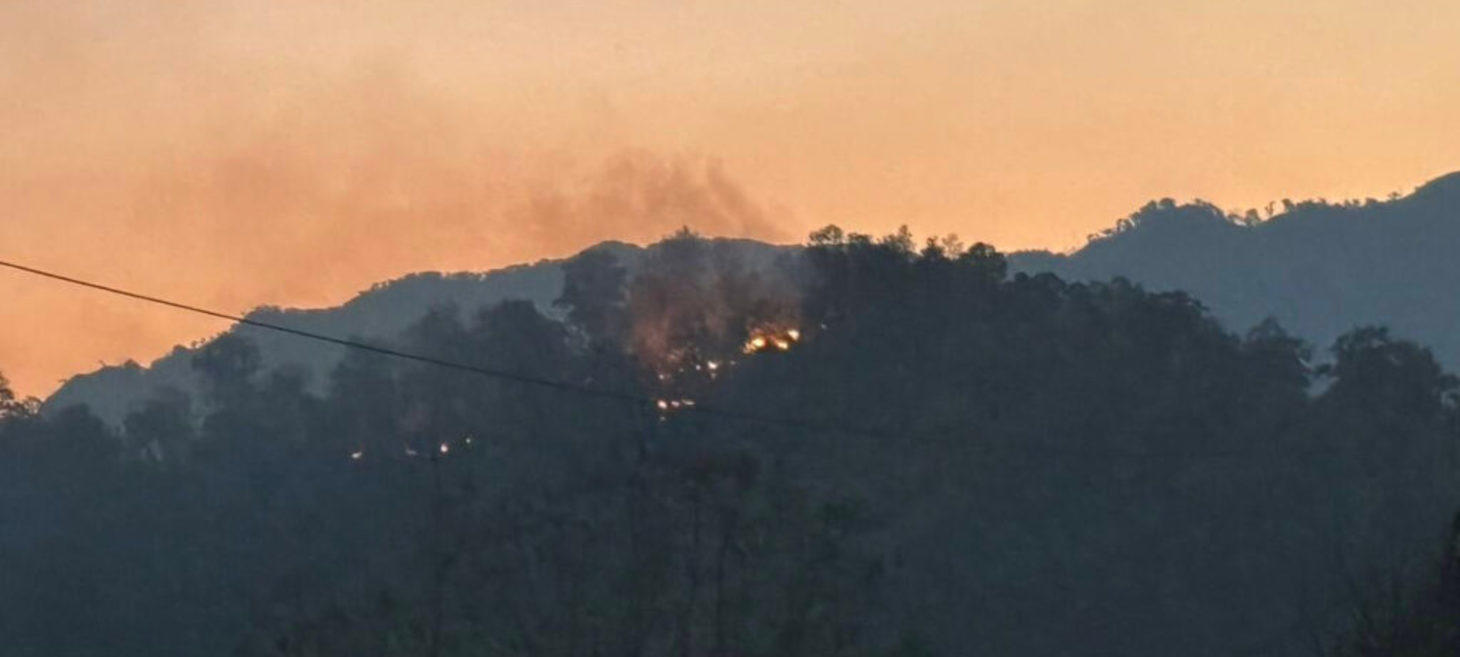
KNLA, Allies Capture Junta Military Base Near Myanmar-Thai Border
The Karen National Liberation Army (KNLA), the armed wing of the Karen National Union (KNU), and its allies seized the junta military’s Pulutu base in Hpa-an District, Karen State, near the Thai border, early Friday morning after nearly a month of fighting. The base was occupied by soldiers of the regime’s Infantry Battalion 31. During the raid, two regime soldiers were reportedly killed and four arrested, while eleven others fled across the Moei River into Thailand. Previously, KNLA snipers had killed six regime soldiers from the same base. The Thai army detained the fleeing soldiers and increased security along the border. This action is part of a larger effort by the KNLA and other resistance groups, including the People’s Defense Force, against the junta, which has been using drones and warplanes in KNU-held territories. The KNLA has also previously seized another strategic base in Mon State.
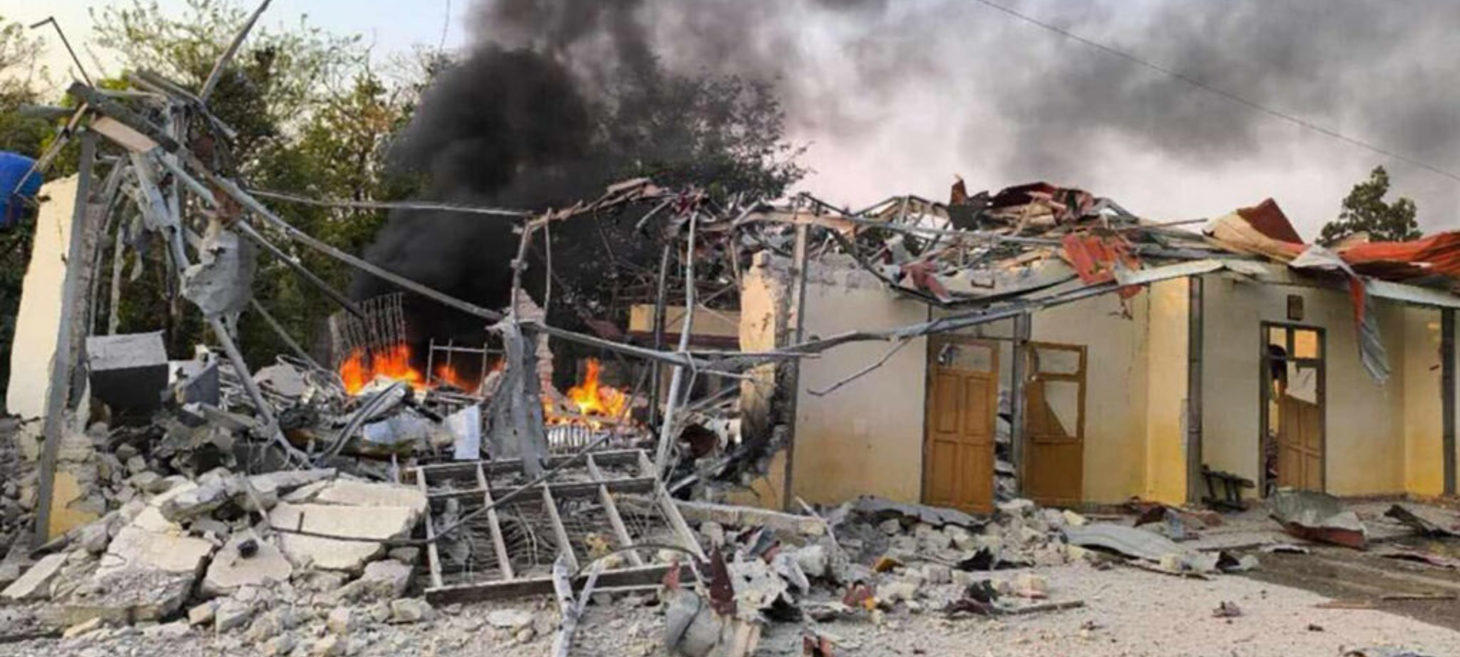
Myanmar Junta Airstrikes Kill 41 Civilians at Monastery and Market
In March 2025, Myanmar junta warplanes carried out separate airstrikes that killed at least 41 civilians, including children and novice monks, in northern Shan State and the Mandalay Region. On Sunday, fourteen people were killed when a fighter jet dropped bombs and used machine guns on the Sein Yadanar Monastery in Nawnghkio town, northern Shan State, which was sheltering residents displaced by fighting between the Ta’ang National Liberation Army (TNLA) and the junta. The victims at the monastery included eight novices and a monk, and 17 others were wounded. Two days earlier, on Friday, an airstrike on a crowded bazaar in Letpanhla village, Singu Township, Mandalay Region, killed 27 civilians, including six children, and wounded another 30. The Mandalay People’s Defense Force (PDF) controlled the area, and they reported that the same village had been bombed previously. The TNLA stated that the junta deliberately targeted civilians, and the resistance group noted an increasing trend of the regime targeting civilians in areas controlled by revolutionary forces. The civilian National Unity Government (NUG) condemned the attacks as brazen violations of international humanitarian laws and reported that junta airstrikes since 2023 had killed 372 children.
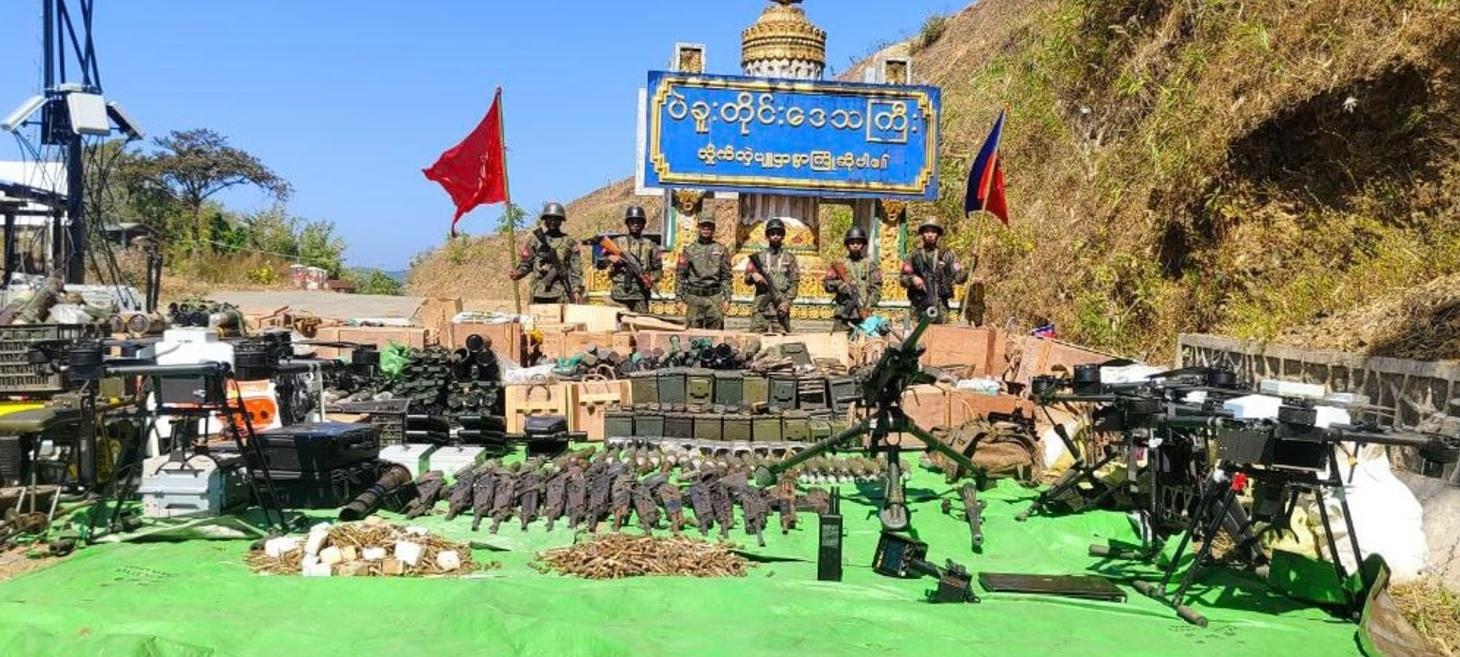
Arakan Army gains ground in Bago Region, seizes key checkpoints from junta
The Arakan Army (AA) has gained significant ground in Bago Region, seizing most junta checkpoints near Nyaung Kyoe Village in Pandaung Township. Fierce battles are ongoing around Pagankwe and Nyaung Kyoe Villages as the AA and its allies advance on junta bases along the Pandaung-Taungup road, which connects Rakhine State and western Bago Region. This offensive puts junta positions under threat, especially considering the AA's previous capture of Moehti Mountain Base and their proximity to key military factories (Defense Industry Factories 5, 6, 9, and 16) near Oke Shit Pin and others (3, 7, and 19) near Pyay. The AA, having already captured 14 townships in Rakhine State and Paletwa in Chin State since launching offensives in November 2023, is now targeting the Rakhine Yoma mountain range and advancing in Ayeyarwady Region, attacking strategic bases like Light Infantry Battalion 308 and seizing its checkpoints. The junta is responding with airstrikes and troop reinforcements, but the AA's progress in both Rakhine and neighboring regions highlights the increasing vulnerability of the regime's military operations.
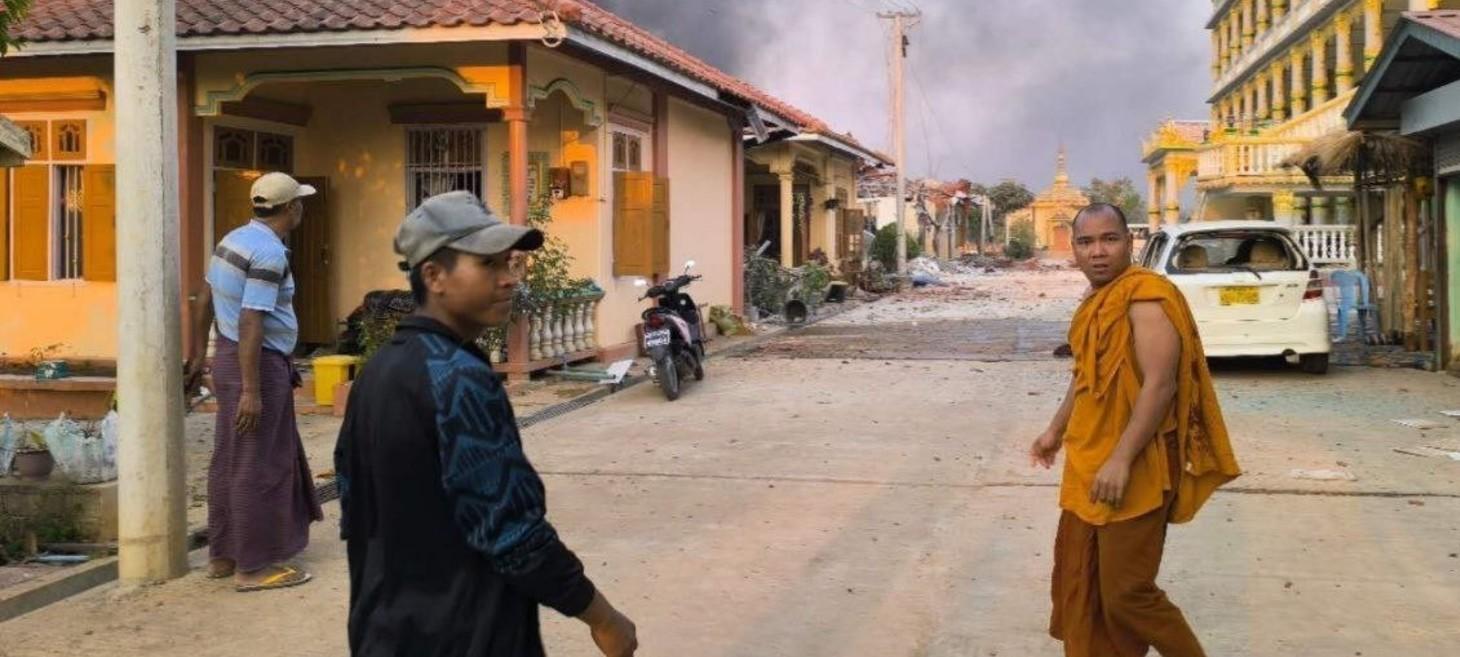
Six monks among nine people killed by Myanmar junta airstrike on TNLA-held town
On March 16, 2025, a Myanmar junta airstrike targeted a monastery in Nawnghkio, a town in northern Shan State controlled by the Ta’ang National Liberation Army (TNLA), resulting in the death of at least nine people, including six monks (two monks and four novice monks) and three civilians who were sheltering there. The airstrike, involving four bombs dropped by a regime warplane around 5:30 pm, also injured at least 17 others, including 13 monks, some critically. Local residents confirmed that the monastery, which served as shelter for displaced civilians, was hit during the airstrike, and no TNLA troops were present at the time. The TNLA reported the casualties, stating that the deceased suffered shrapnel wounds.
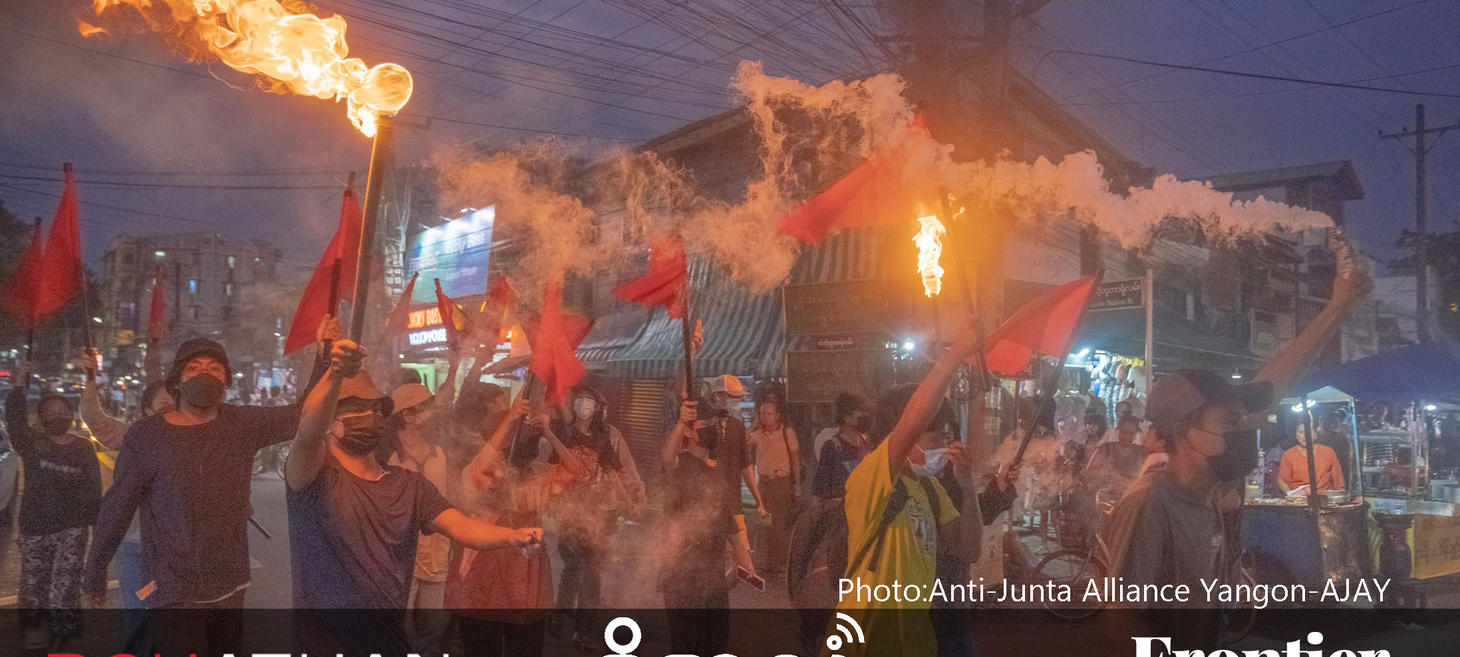
Protest and survival on the streets of Myanmar cities
Frontier Myanmar reports on the ongoing street protests organized by the opposition in Myanmar despite the significant risks of imprisonment, torture, or death, highlighting the importance of proper planning for protestors. The Doh Athan podcast, a weekly human rights podcast by local journalists in partnership with Fondation Hirondelle, features stories about how protests have changed since the coup and the reasons why people take such risks. Doh Athan also covers other critical issues arising from the post-coup conflict, such as the strain on relationships of resistance fighters due to separation and tales of forced recruitment, alongside broader Myanmar current affairs reported across various sections of Frontier Myanmar, including news, business, and opinion. Frontier Myanmar provides several ways to stay informed, including newsletters and subscription options, and publishes its content in both English and Burmese.
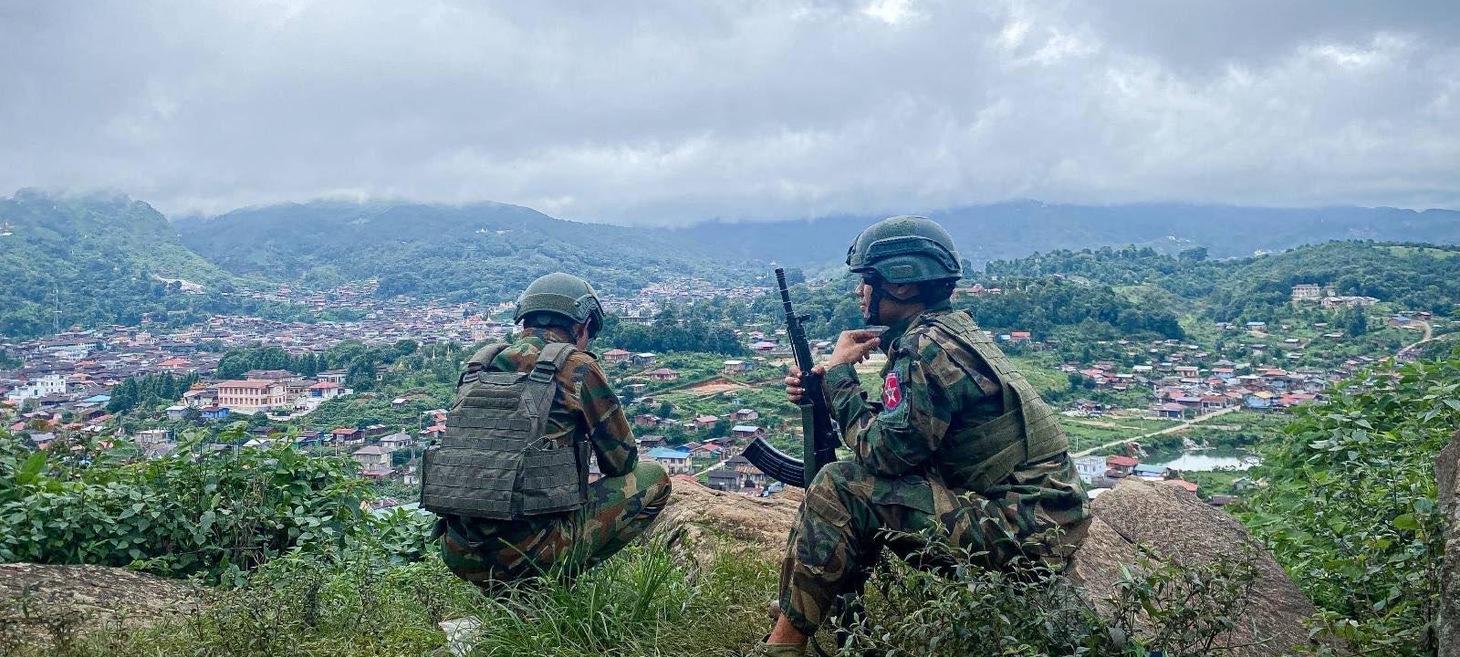
TNLA’s recruitment plans alarm civilians in Mogok
Residents of Mogok, Mandalay Region, which is controlled by the Ta’ang National Liberation Army (TNLA), are concerned about the group's recent announcement of a new "city defence force" that would require civilian service. According to a Mogok resident, town administrators informed residents that men and women between 18 and 45 would be required to join this force after TNLA officials held a meeting. The residents are reportedly refusing to accept this, as they were told it is mandatory and there were implications of forced recruitment if people did not join voluntarily. This situation has led to discussions among the residents about how to unite and protect themselves.
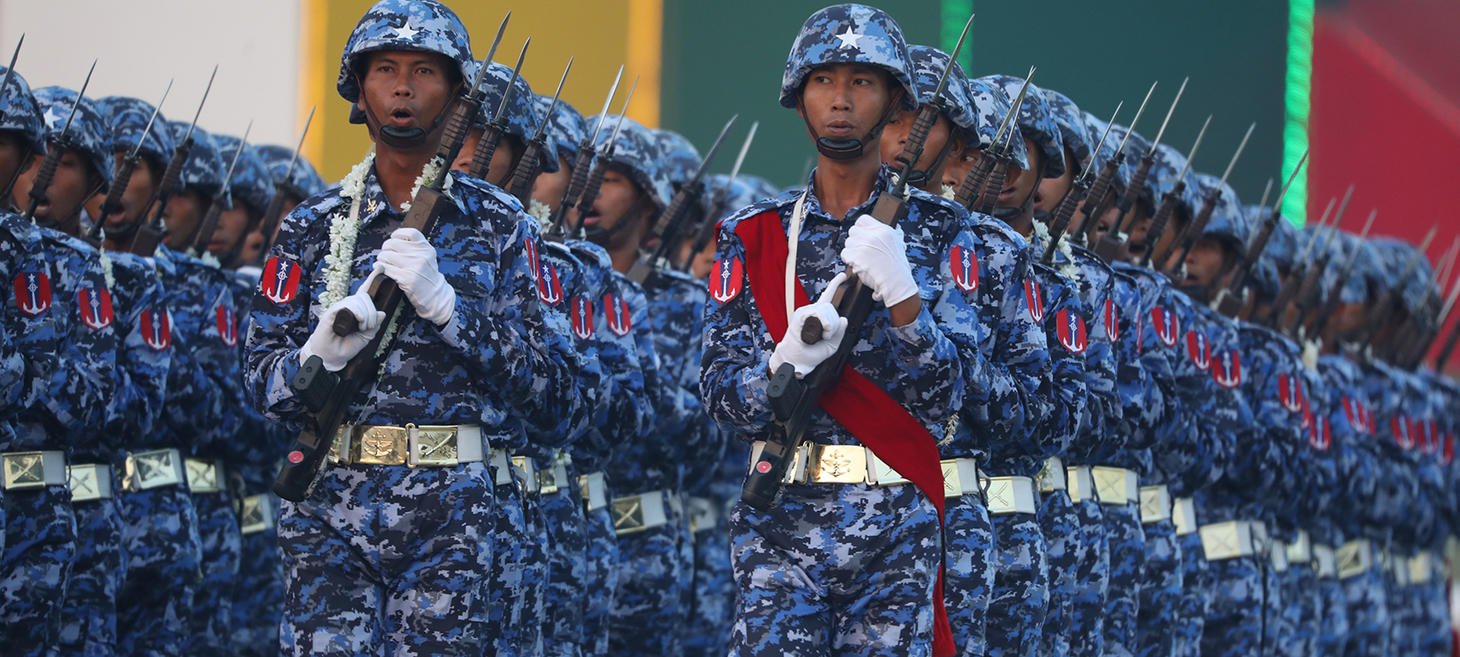
Mapping the Myanmar Junta’s Gains, Losses, and Stalemates Since Operation 1027
Since the launch of Operation 1027 in 2023, the Myanmar junta initially faced significant losses, forcing them into a defensive posture. However, in 2024, the regime adopted a more dynamic strategy involving mobile defenses and counteroffensives across various regions like Kachin, Sagaing, Mandalay, and Shan states. While the junta has managed to reclaim a few areas such as Kawlin, Hsihseng, Twin Nge, and Taunghkam, these gains constitute less than 1% of the territory initially lost to resistance forces and remain vulnerable to counterattacks. The junta's tactics now heavily rely on air support and single-column operations, often targeting civilians suspected of supporting the resistance, while resistance forces employ guerilla warfare and face challenges in coordination and countering the junta's advanced weaponry. Overall, despite adapting their strategies, the junta's achievements on a national scale since Operation 1027 remain limited, and the civil war continues intensely across the country.
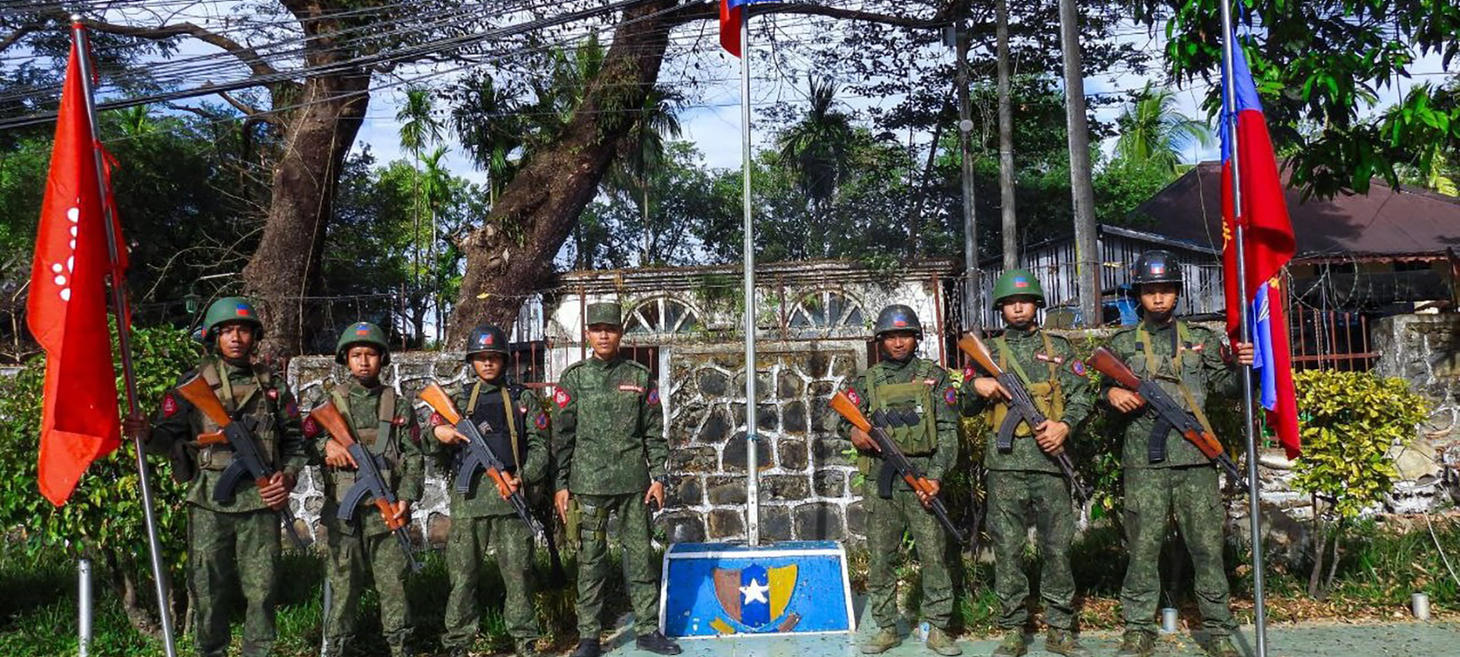
The Uncertain Future of Myanmar’s Rakhine State
The Arakan Army/United League of Arakan (AA/ULA) has achieved significant military gains in Myanmar's Rakhine State, potentially leading to independence after driving out State Administration Council (SAC) forces and threatening key areas. While their political aspirations beyond complete control of Rakhine remain somewhat unclear, they are aiming for effective independence, possibly through a confederation, but face major challenges including military consolidation, humanitarian and development needs, intercommunal relations with various ethnic groups including the Rohingya, and navigating the international arena. The future status and rights of the Rohingya population within a potentially independent Rakhine are a crucial and uncertain aspect, requiring discussions on citizenship and repatriation, especially given the complex relationships with Rohingya militant groups and the involvement of international actors like Bangladesh. The AA/ULA has demonstrated strategic competence in its military advancements and will likely continue to plan for consolidating its future in the region, engaging with countries like China and India while remaining wary of Western dependence.
Conscription
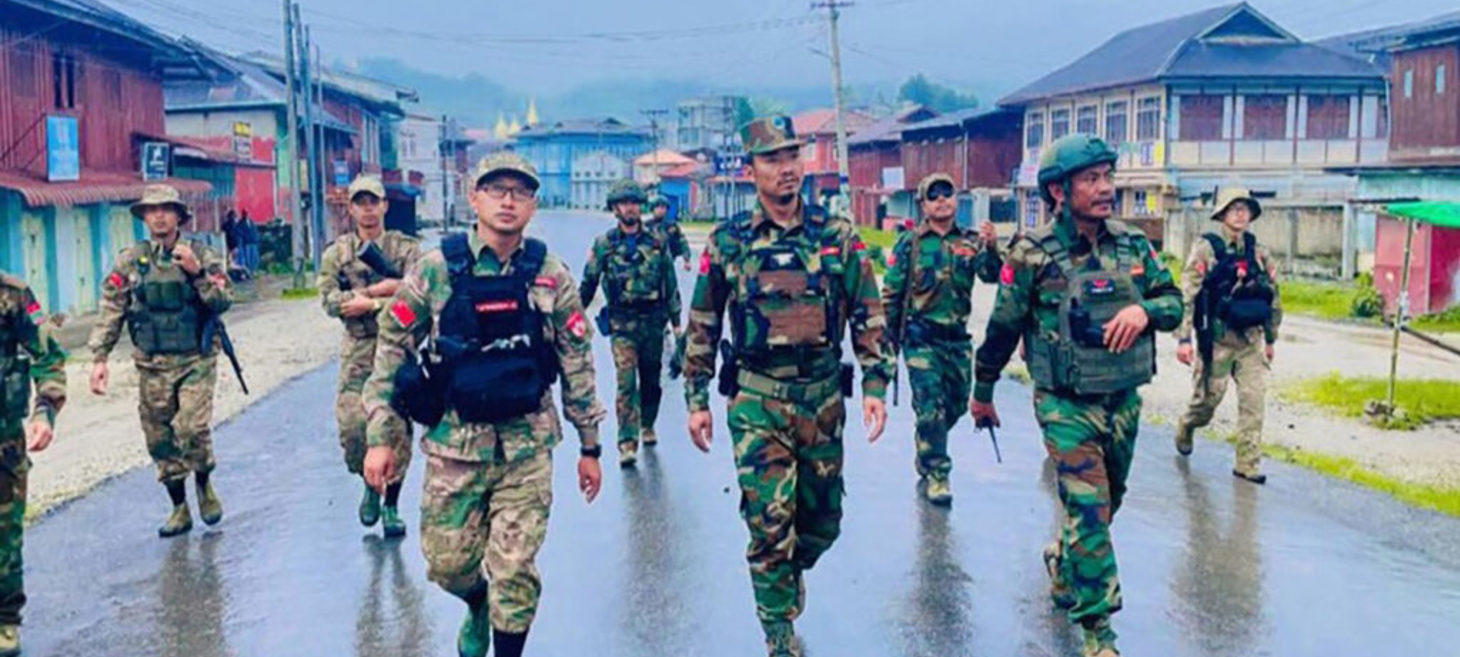
TNLA Forcing Conscription in Mandalay Region: Residents
The Ta’ang National Liberation Army (TNLA) is reportedly forcing conscription in Mogoke, a ruby-mining town in the northern Mandalay Region, attempting to recruit one man aged 18 to 45 from every household to form a local armed force. This action has led to protests from residents, who claim the TNLA is now abducting men and forcibly recruiting women. TNLA-appointed ward administrators have reportedly resigned in protest of the conscription, and the group allegedly threatened protesting residents. Residents express discontent with having to defend the town themselves while paying taxes to the TNLA, and community representatives plan to formally object to the forced conscription. The TNLA, which took control of Mogoke in July of the previous year and is a member of the Brotherhood Alliance, is also reportedly trying to restrict internet and phone access.
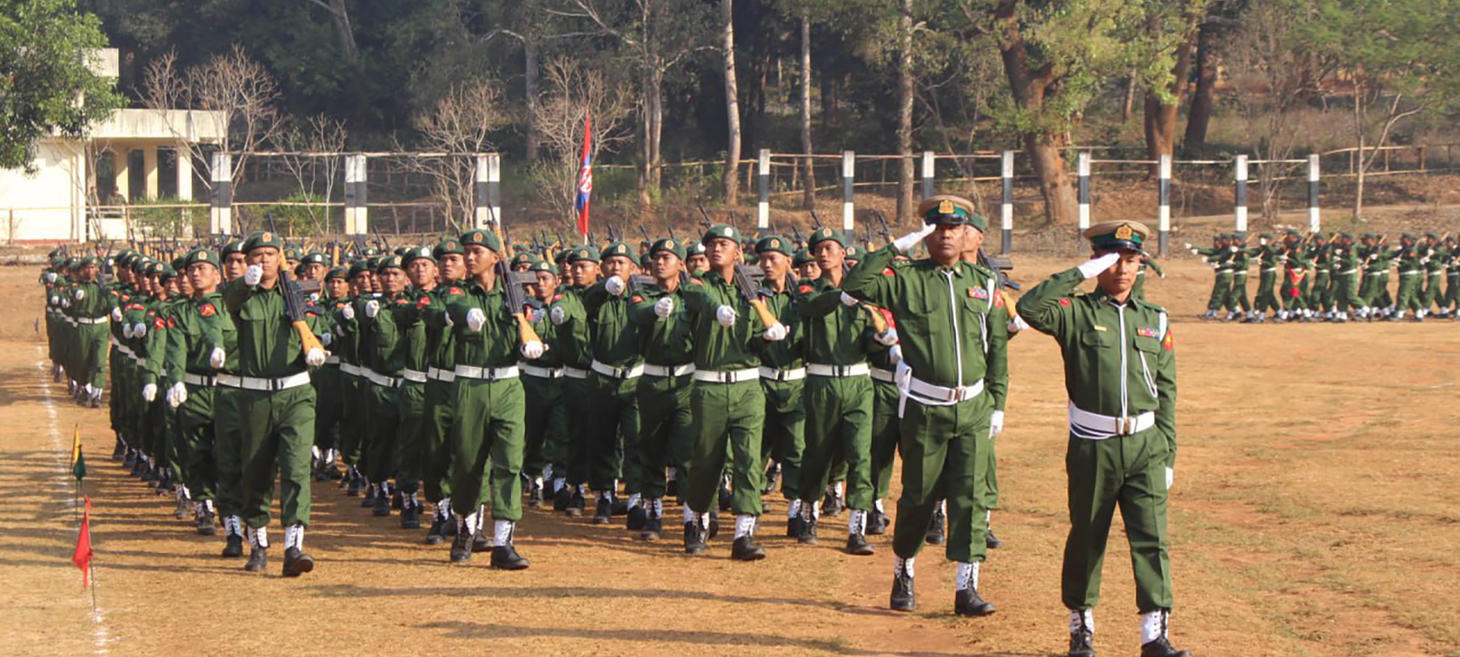
Myanmar Junta Blackmailing Parents to Enforce Conscription
The Myanmar junta in Mandalay Region is intensifying efforts to enforce mandatory military service by blackmailing parents to ensure their children report for conscription. Local authorities are pressuring parents through various means, including forcing them to sign declarations to participate in the lottery system and threatening imprisonment under the Conscription Law if their children fail to appear. Reports indicate that parents are being held responsible for ensuring their children's return for medical tests, with threats of finding substitutes among relatives. This pressure is a response to attempts to evade conscription through bribery, a practice that has been discontinued. Consequently, many young men are fleeing their homes to avoid conscription, especially after learning that previous conscripted batches were deployed on the frontline. The Conscription Law, enacted last year, disproportionately affects lower-income families, causing separations and potential loss of life, while there are claims that it exempts the children of high-ranking officials. Analysts suggest the conscription drive aims to create "human shields" in ongoing conflicts.
Crime & Narcotics
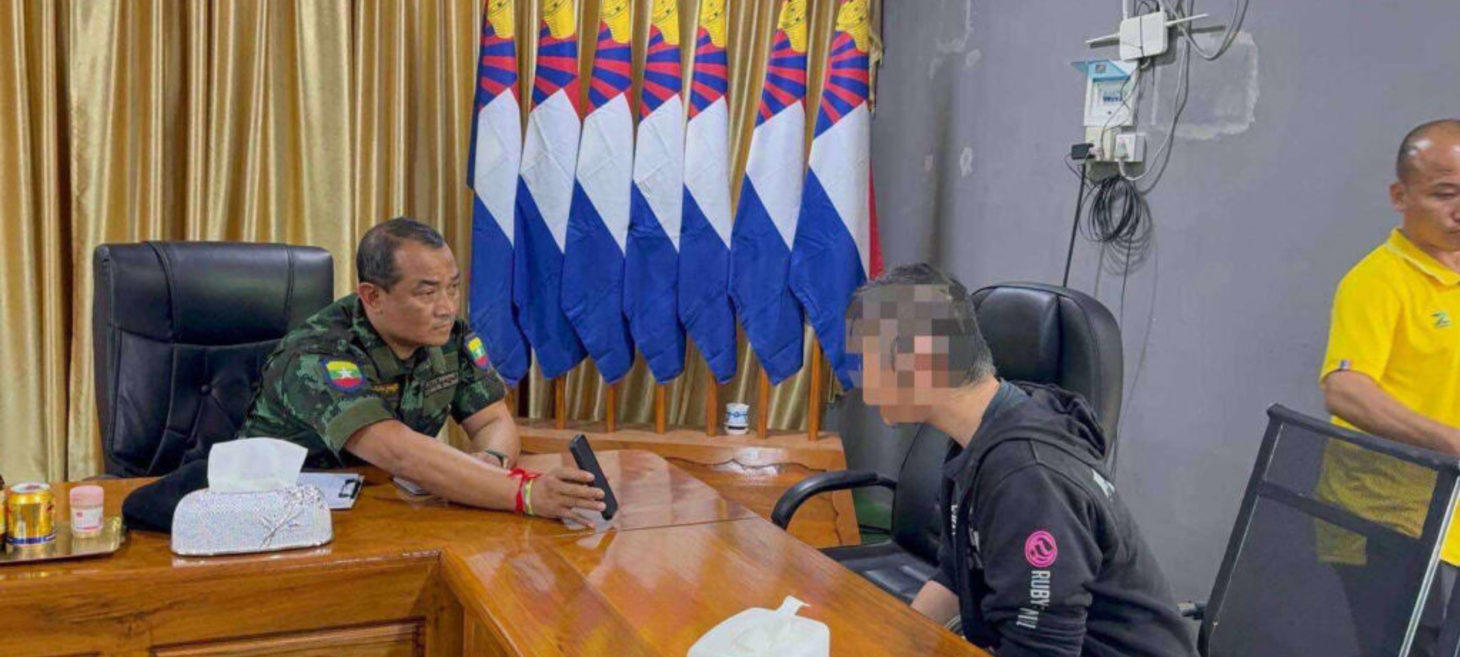
Wanted Japanese Cyber Fraudster Held in Myawaddy
A Japanese citizen wanted for cyber fraud in Japan has been apprehended in Myawaddy Township, Karen State, by the Karen Border Guard Force (BGF). This arrest occurred after the Japanese Embassy in Yangon identified him as a fugitive to the militia, who had previously rounded up thousands of foreigners from scam centers in the area under international pressure. The 36-year-old man from Hokkaido arrived in Myawaddy a month prior and was found at a company in Shwe Kokko, a known scam center hub. He reportedly traveled from Japan to Shanghai, then Dubai where he lost his passport, obtained a new one, and subsequently flew to Bangkok before being taken to Mae Sot and then Myawaddy by a Chinese friend. While some Japanese news outlets suggest he was working with Chinese scam syndicates targeting Japanese citizens, the Thai and Japanese governments have not yet informed the BGF when they will take custody of him.
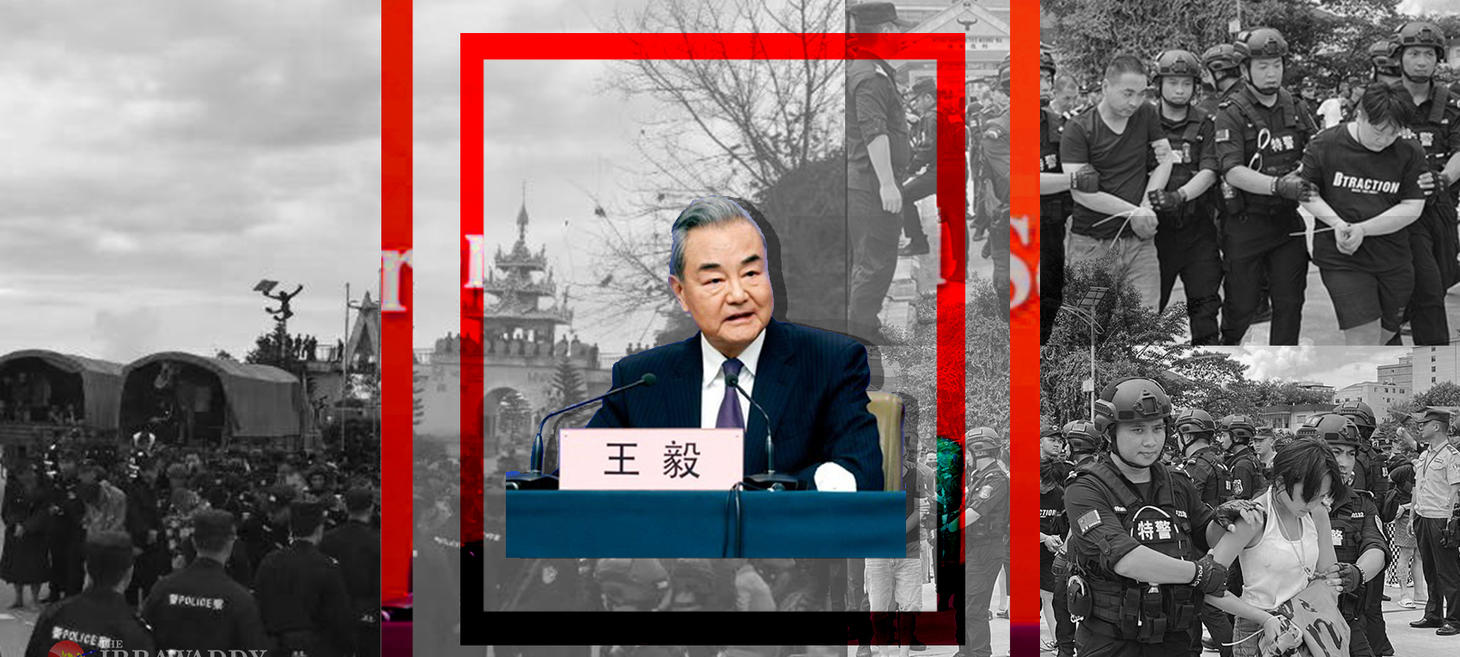
Scam Centers ‘Alive and Kicking’ in Shan State
Despite claims by the Chinese government of their elimination, scam centers remain active in Myanmar's northern Shan State, particularly in areas under the control of the junta and the United Wa State Army (UWSA). While China successfully clamped down on cyber fraud in Kokang, now controlled by the Myanmar National Democratic Alliance Army (MNDAA), and some smaller crackdowns occurred in Mongyai and Hopang with arrests made by both the junta and the UWSA, locals report that these operations persist in other areas like Muse because some local administrative authorities profit from them. These scam businesses are mostly run by Chinese nationals, and while the regime declares fighting cyber scams a "national duty" and the UWSA is influenced by China, Beijing's influence in northeastern and eastern Shan has limits. The continued operation of these centers in Shan State exists even as international attention has shifted to crackdowns in Karen State along the Thai border, where a large number of workers remain in scam operations.
Economy
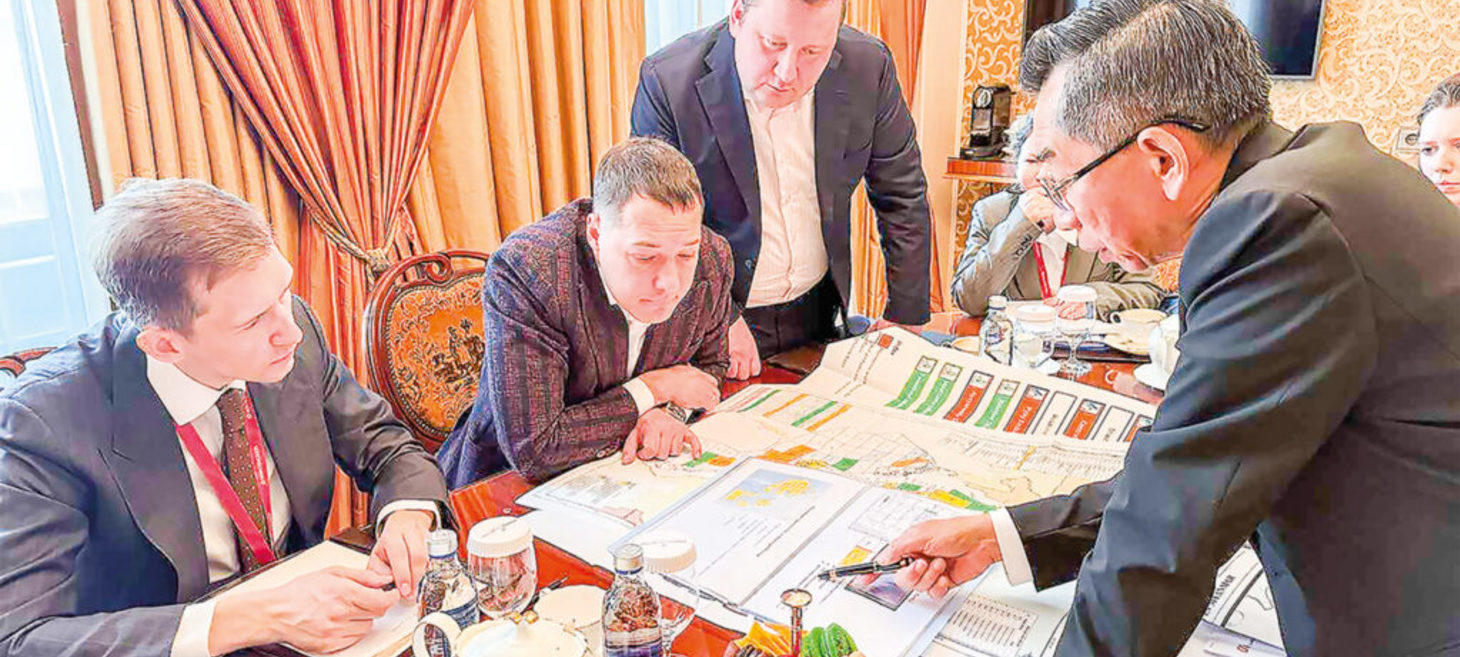
Myanmar Inches Closer to Reviving Dawei Mega-Project with Russian Money
Myanmar is taking steps to revive the long-stalled Dawei Special Economic Zone (SEZ) mega-project in Tanintharyi, which includes a deep-sea port, airport, and various industries, with potential Russian investment. Deputy junta chief Soe Win has called for dissolving the existing Dawei Special Economic Zone Development Company Ltd., which was a special purpose vehicle involving Thailand and Japan, to make way for investment from Russia and Belarus. This move comes after discussions between junta leader Min Aung Hlaing and Russian counterparts, including the signing of a memorandum on investment cooperation that now includes a coal-fired power plant and oil refinery. While Russian Prime Minister Mikhail Mishustin has indicated Russian companies are "ready" to invest, the project, initiated in 2008 and plagued by delays, funding issues, and human rights accusations resulting in the cancellation of the contract with Italian-Thai Development in 2021, faces opposition from the parallel National Unity Government (NUG) and local civil society organizations who warn of invalid agreements and potential worsening of human rights and environmental issues. The junta views the SEZ's development not only economically but also politically and geopolitically, seeking Russian cooperation due to insufficient support from China alone.
Ethnic Issues
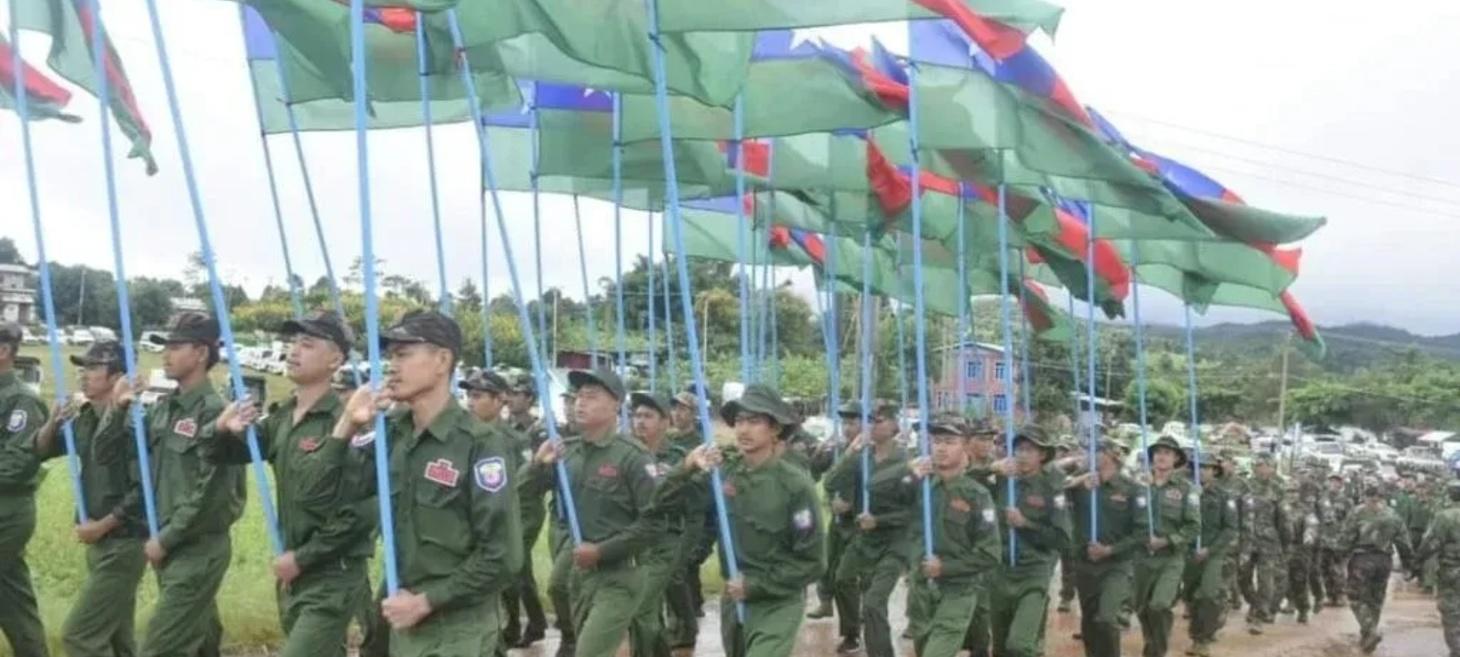
PNO Militia Enforces Military Recruitment and Heavy Taxes, Straining Local Communities in Shan State
In Southern Shan State's Samka region, the Pa-O National Organization (PNO) militia is enforcing military recruitment, prioritizing Pa-O-speaking villagers, while other ethnic groups face mandatory monthly fees. This, coupled with heavy taxation on businesses such as sand and brick quarries in Taunggyi and gas stations in other townships, is straining the financial resources of local communities. Residents express increasing difficulty in earning a living due to these relentless levies. Furthermore, in Taunggyi, authorities, including the PNO, are confiscating unregistered vehicles. These actions, including forced recruitment, heavy taxation, and confiscations, have created a climate of fear and instability across Shan State, leaving residents to endure significant economic hardship and concerns for their personal safety.
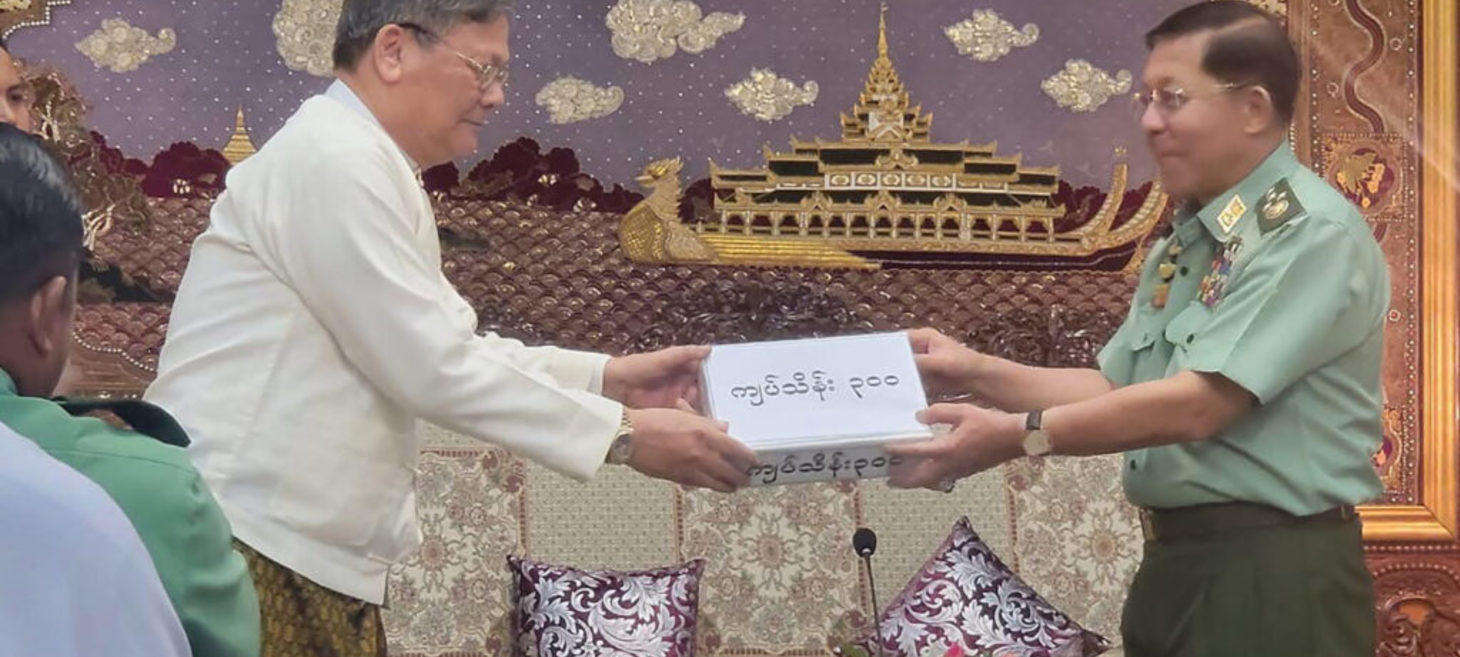
AA Reportedly Seizes Millions of Dollars’ Worth of Controversial Rakhine Businessman’s Assets
The Arakan Army (AA) reportedly froze at least US$6 million worth of assets belonging to prominent ethnic Rakhine businessman Kyauk Taung in Taungup town, Rakhine State, earlier in March 2025. While the exact reason for the seizure is unknown, speculation suggests it stems from his alleged close ties to the Myanmar military junta. Kyauk Taung, who operates a ferry service and is involved in cross-border trade with Bangladesh, is also the vice-chair of Myanmar Kyauk Phyu Special Economic Zone Holding Public Co. Ltd., which is jointly developing the Kyaukphyu SEZ with China. Despite past controversies involving a housing project during the NLD government and his alleged support for the military-backed USDP party, Kyauk Taung denies any political involvement and claims he is solely focused on regional development. He speculated that jealousy over his wealth might have led to the allegations against him.
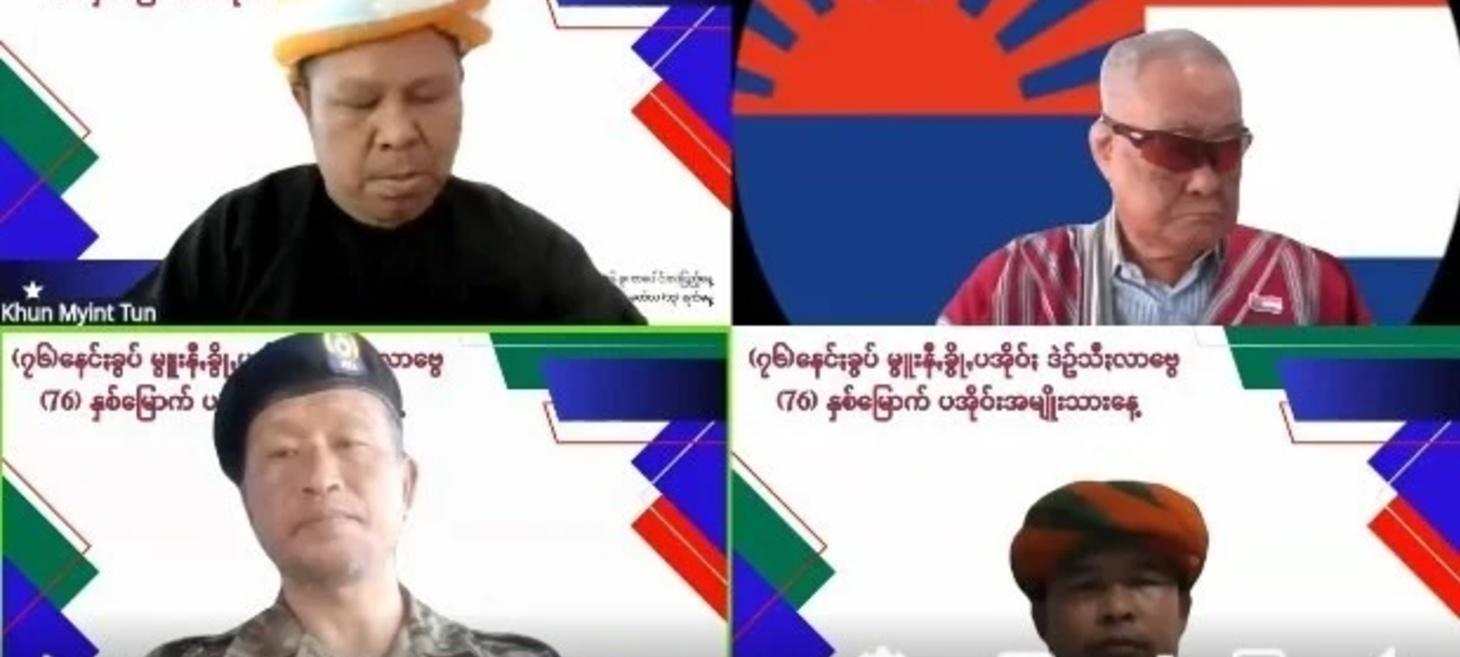
PA-O ETHNONATIONALISM: PNO urged to abandon junta and join the revolution
The Shan Herald Agency for News reports on calls for the Pa-O National Organization (PNO) to abandon its alliance with the military junta (SAC) and join the revolutionary efforts of the Pa-O National Liberation Organization (PNLO) and Pa-O National Federal Council (PNFC). These revolutionary groups advocate for a federal democratic union that could include a Pa-O state, to be achieved through political negotiation. They highlight joint statements made on the 75th and 76th Pa-O National Day anniversaries expressing this aspiration and emphasizing the need for Pa-O unity against the junta. The PNLO and PNFC criticize the PNO's collaboration with the junta, arguing it fosters resentment from other ethnic groups and endangers Pa-O youth through forced conscription. They contrast their politically mature approach with the territorial expansionism of other ethnic armed organizations like the TNLA and MNDAA, emphasizing that sovereignty belongs to the local people and the formation of federal units should be a collective effort. Ultimately, the PNO is urged to return to its original goals of opposing the military dictatorship and striving for freedom within a federal democratic framework.
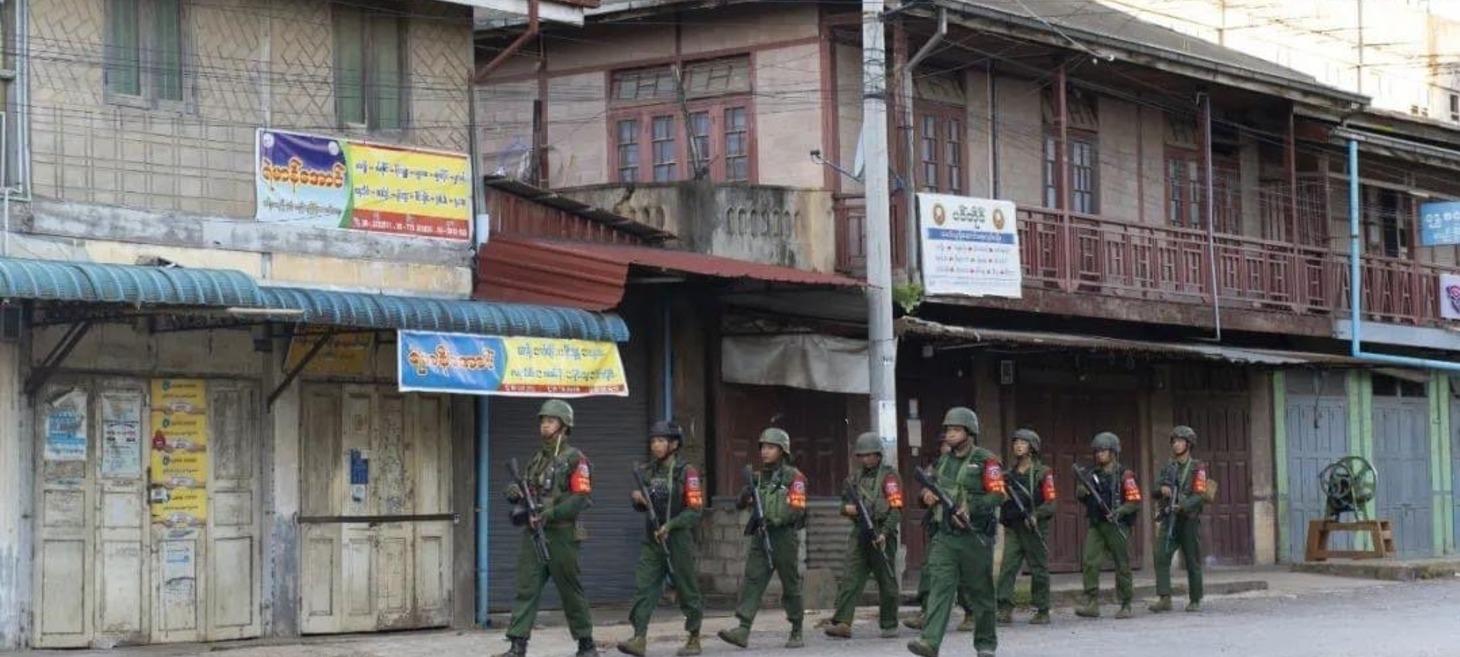
Lashio residents deny reports of MNDAA withdrawal from city
Residents and sources close to the Myanmar National Democratic Alliance Army (MNDAA) are denying rumours that the group has begun withdrawing its troops from Lashio, the largest city in northern Shan State, which it has controlled since last August. A Lashio resident stated that the city is still under the control of the Kokang army, refuting claims of a large troop departure. According to the source, an MNDAA officer indicated in a meeting with Lashio residents that the decision regarding their continued presence would depend on both orders from higher authorities and the desires of the local population.
Foreign Affairs

Trump Freezes US-Funded Media Outlets Including Voice of America
On Saturday, March 16, 2025, President Donald Trump's administration abruptly froze funding for several US-funded media outlets, including Voice of America (VOA), Radio Free Asia (RFA), and Radio Free Europe/Radio Liberty (RFE/RL), placing hundreds of staffers on leave and requiring them to surrender press passes and equipment. The administration described the US Agency for Global Media, which oversees these outlets, as an "unnecessary" part of the federal bureaucracy and stated the cuts would stop taxpayer money from funding "radical propaganda". This action was met with strong criticism, with the director of VOA expressing concern about the outlet's ability to carry out its vital mission of reaching 360 million people weekly in 48 languages, and the president of RFE/RL calling the funding cancellation "a massive gift to America’s enemies" like Iran, China, and Russia. These outlets, established to counter information offensives and provide uncensored reporting in countries without free media, have historically enjoyed bipartisan support, and the move is expected to face challenges, particularly concerning Congress's power of the purse.
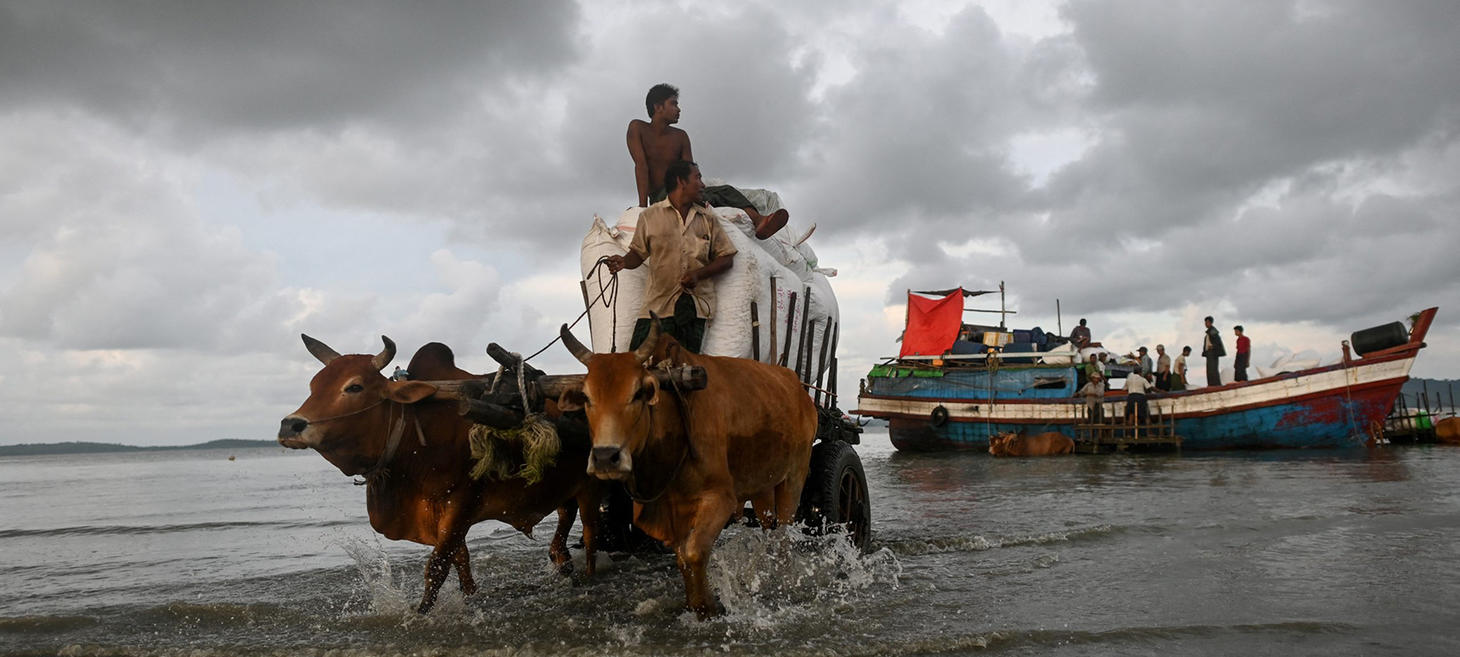
Myanmar Junta Pushes Chinese BRI projects in Rakhine Amid Fierce Fighting
Despite ongoing fierce fighting with the Arakan Army (AA) in Rakhine State's Kyaukphyu, the Myanmar junta is actively pushing forward with China-backed Belt and Road Initiative (BRI) projects, particularly the Kyaukphyu Special Economic Zone (SEZ) and deep-sea port. Deputy junta chief Soe Win emphasized the crucial geopolitical and economic importance of the Kyaukphyu SEZ, highlighting its role in the China-Myanmar Economic Corridor (CMEC) and providing China with direct access to the Indian Ocean. The project, initially contracted in 2015 and renegotiated in 2018 to increase Myanmar's stake, has a substantial budget, but construction progress on the port has stalled despite an extended completion deadline of June 2025. The junta's renewed commitment to the BRI, emphasized by Min Aung Hlaing, comes after Chinese intervention in northern Shan State and amidst reports of potential Chinese security deployment to protect investments in Myanmar.
Governance & Rule of Law
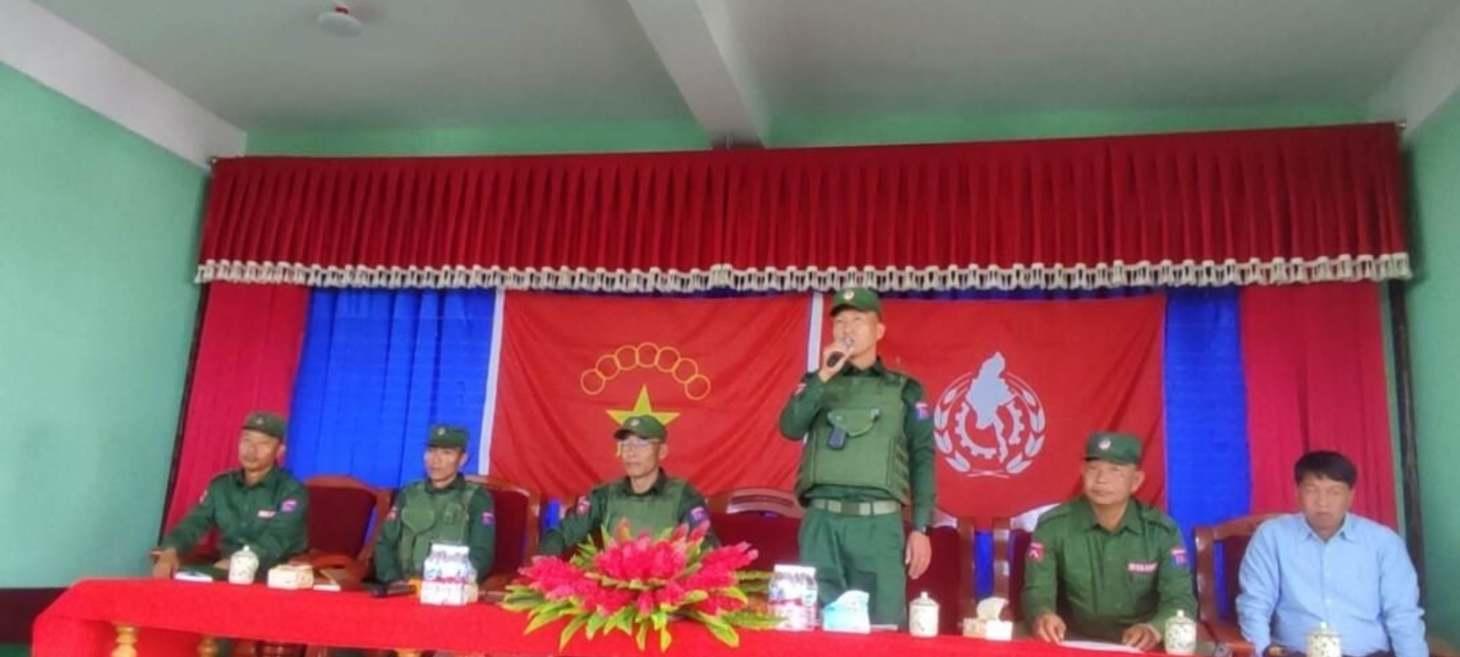
MNDAA Detainee Dies After Severe Beating in Custody
A municipal worker in Hsenwi Township, Shan State, died after being severely beaten while in the custody of the Myanmar National Democratic Alliance Army (MNDAA), also known as the Kokang Army. The 50-year-old garbage truck driver and waste collector was arrested on March 12, 2025, in connection with a robbery and murder at the township’s old market. Local residents reported that he was tortured to death within a single day of his detention and had been previously displaced by the MNDAA. This incident has sparked widespread concern and demands for accountability regarding extrajudicial killings and torture by armed groups in the region. The Shan Herald Agency for News (SHAN) has been unable to obtain comments from MNDAA officials regarding this and other recent violent events in Hsenwi Township, including the killing of a village head and his grandson. Furthermore, residents have raised concerns about increased lawlessness due to the MNDAA allowing gambling dens to operate continuously. The international community is being urged to investigate these allegations of human rights abuses in the area.
Humanitarian
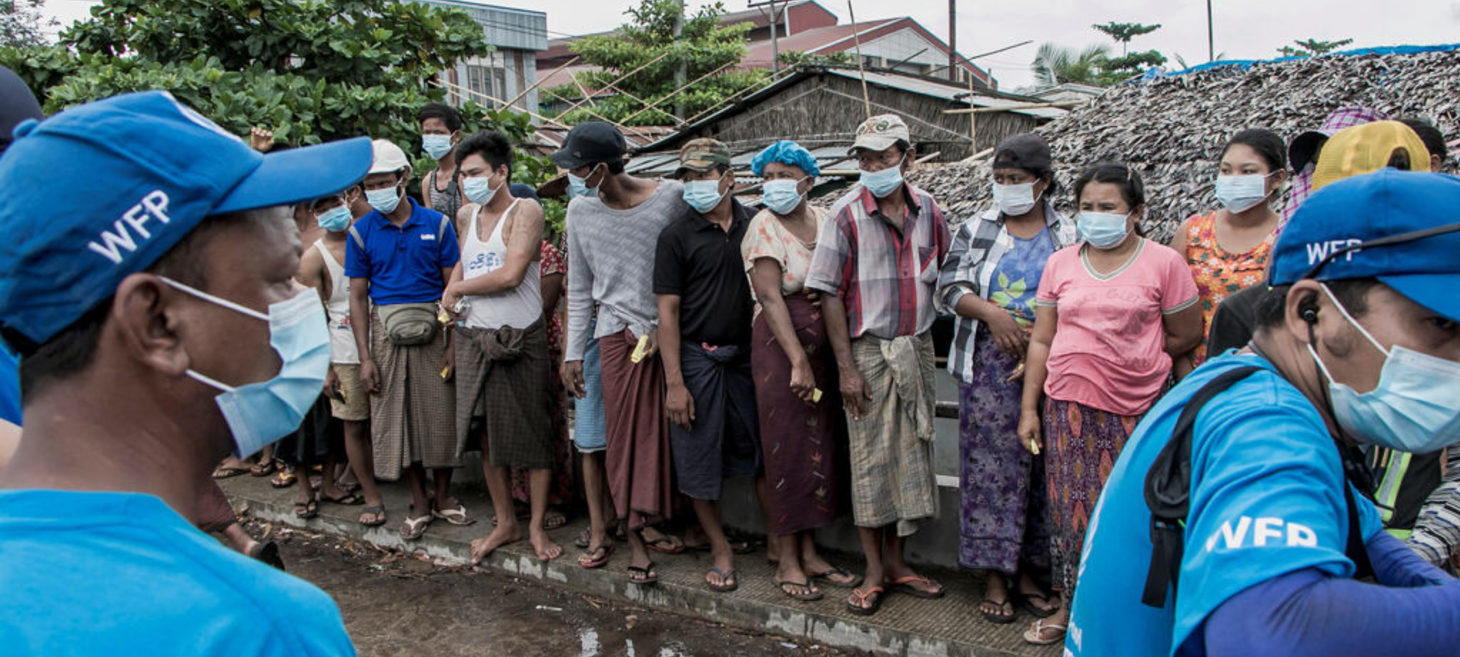
WFP to Cut Food Aid to 1 Million People in Myanmar
Due to critical funding shortfalls, the UN’s World Food Programme (WFP) will be forced to cut off vital food aid to 1 million people in war-torn Myanmar starting in April. This reduction in assistance comes at a time when more than 15 million people in Myanmar are unable to meet their daily food needs, with over 2 million facing emergency levels of hunger, exacerbated by the ongoing civil war since the 2021 military coup, leading to a "polycrisis" with a fractured economy and complicated aid supply. The WFP urgently needs $60 million to maintain its life-saving food assistance this year, and the upcoming cuts will particularly affect 100,000 internally displaced people in Rakhine State who will have no access to food without WFP aid, occurring just before the "lean season" for staple crops. While the WFP did not name specific donors, the article mentions that US international aid funding was slashed under President Donald Trump, who, along with Elon Musk, has been critical of USAID, a major WFP contributor.
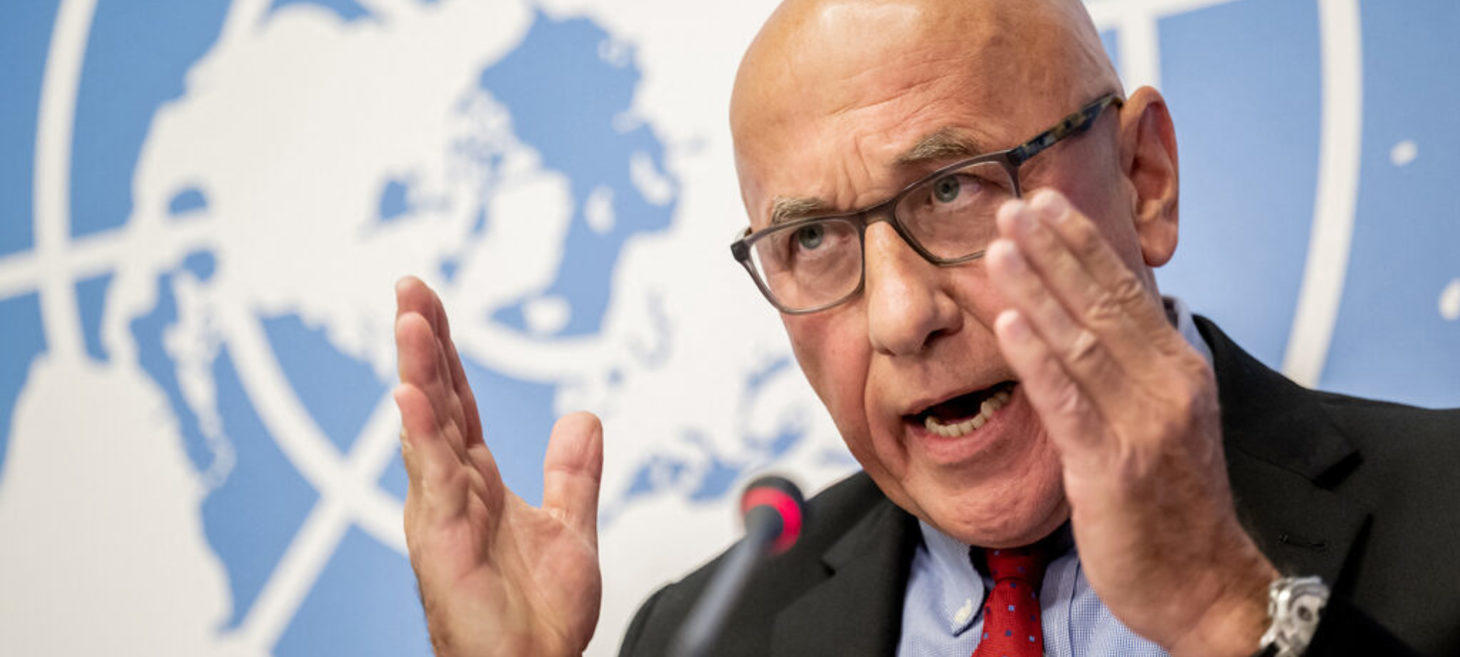
Myanmar Faces “Untold” Suffering Due to US Aid “Betrayal”: UN Expert
UN Special Rapporteur on Myanmar, Tom Andrews, has lambasted the US foreign aid cuts as a shameful act of betrayal that will cause untold suffering and death in the war-ravaged country. Andrews stated that these politically motivated cuts, based on false declarations about corruption, waste, and abuse, are already having a crushing impact on the people of Myanmar. He highlighted the dire situation in Myanmar following the 2021 junta coup, with over 3.5 million displaced, over 6,300 civilians killed, 19.9 million in need of humanitarian assistance, and more than half the population in poverty. Andrews emphasized that the abrupt termination of aid, which is literally keeping people alive, will lead to unnecessary death and is being done in the worst possible way without allowing for contingency plans. He urged the UN Human Rights Council to take a stand against this "catastrophe" and "cruel" decision.

A Bleak Future for Rohingya Refugees
Despite the U.N. secretary-general’s visit to Bangladesh, the future for Rohingya refugees remains bleak due to escalating conflict in Myanmar’s Rakhine State and recent developments such as the Arakan Army’s ban on the term “Rohingya”. The situation is further compounded by dwindling food aid from the World Food Program (WFP) due to severe funding shortfalls, which could lead to severe consequences for the over one million Rohingya dependent on aid. While the visit of U.N. Secretary-General António Guterres and Bangladesh’s interim government’s chief adviser, Dr. Muhammad Yunus, may draw attention and help raise funds, progress on repatriation is largely dependent on Myanmar, where exclusionary policies persist. Nay San Lwin of the Free Rohingya Coalition advocates for empowering Rohingya in Bangladesh through work permits and vocational training as a sustainable solution, while also emphasizing the need for international pressure on Myanmar and the Arakan Army, and for accountability for genocide from the ICC and ICJ.
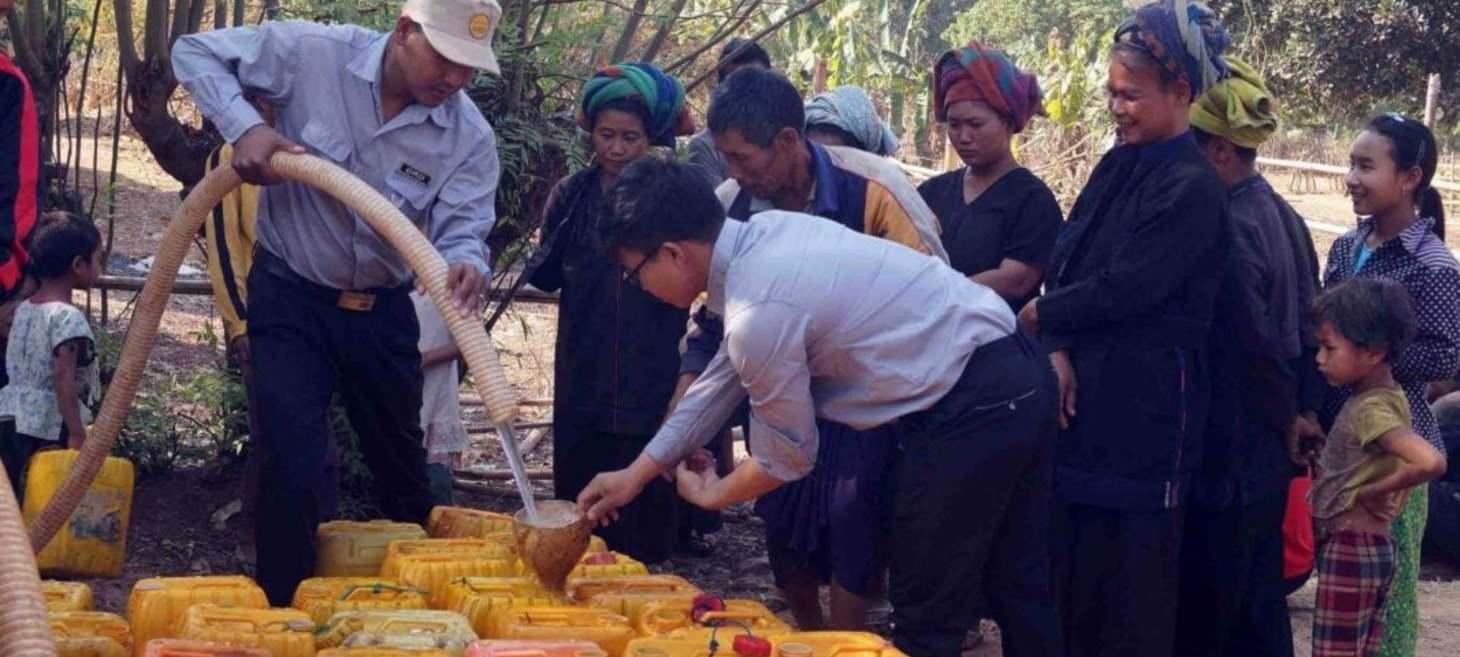
Water Shortages Hit Hsihseng Town in Shan State
Hsihseng Town in Shan State is currently facing significant water shortages due to budget constraints and power outages affecting the junta's ability to operate water pumps effectively, despite the availability of natural water resources. This situation, particularly severe since early March 2025, has led residents in lower-lying areas to receive inconsistent piped water, while those in higher elevations are largely without access, forcing some to rely on costly private water suppliers or public wells. The municipal department has attempted to mitigate the issue by using solar power, but it is insufficient to meet the town's needs. The sources also report on various human rights concerns in Shan State, including a junta airstrike on a monastery in Nawnghkio that killed several novice monks and civilians, the death of an MNDAA detainee after severe beating, and the PNO militia enforcing military recruitment and heavy taxes. Additionally, the sources cover topics like PA-O ethnonationalism, Min Aung Hlaing's trip to Russia, forced conscription, and new taxes imposed by the TNLA and the PNO.
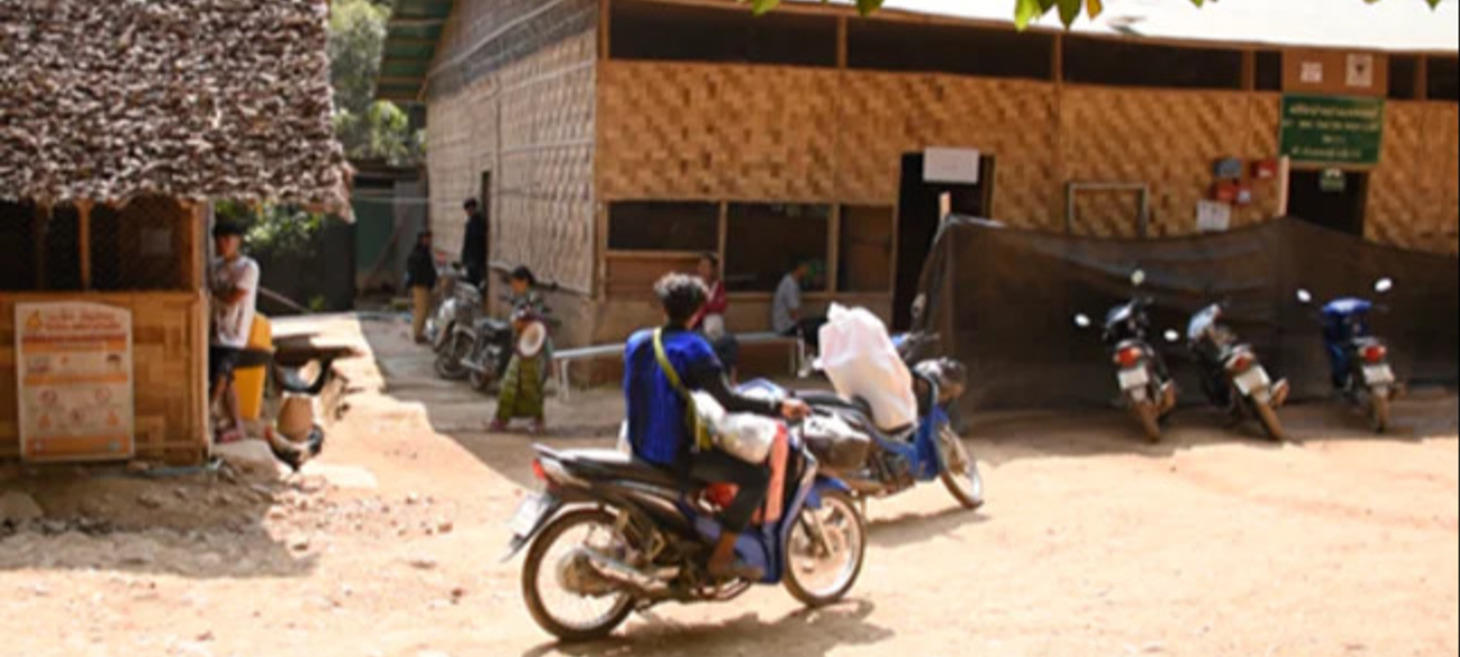
US Aid Cuts Affect Karenni Refugee Camp Clinics
Due to a sudden 90-day suspension of US international aid starting January 28, 2025, clinics in No. 1 and No. 2 Karenni Refugee Camps, supported by the International Rescue Committee (IRC), have faced severe funding cuts, leading to the cancellation of IRC-provided services and the closure of clinics to all but emergency cases. This has resulted in a critical shortage of medicine, leaving staff unable to treat even emergency patients adequately, and a reduction in staff, impacting community healthcare and mental health services. While emergency care, reproductive and child health services, and essential diagnostic functions will continue with limited capacity, the clinics are struggling with a lack of oxygen, fuel for generators, and transport to Thai hospitals, causing financial burdens for patients and tragically contributing to reported deaths due to delayed treatment. The Karenni Health Department (KnHD) is seeking alternative funding and support from the revolutionary Karenni State government to sustain essential services during this challenging period.
Politics
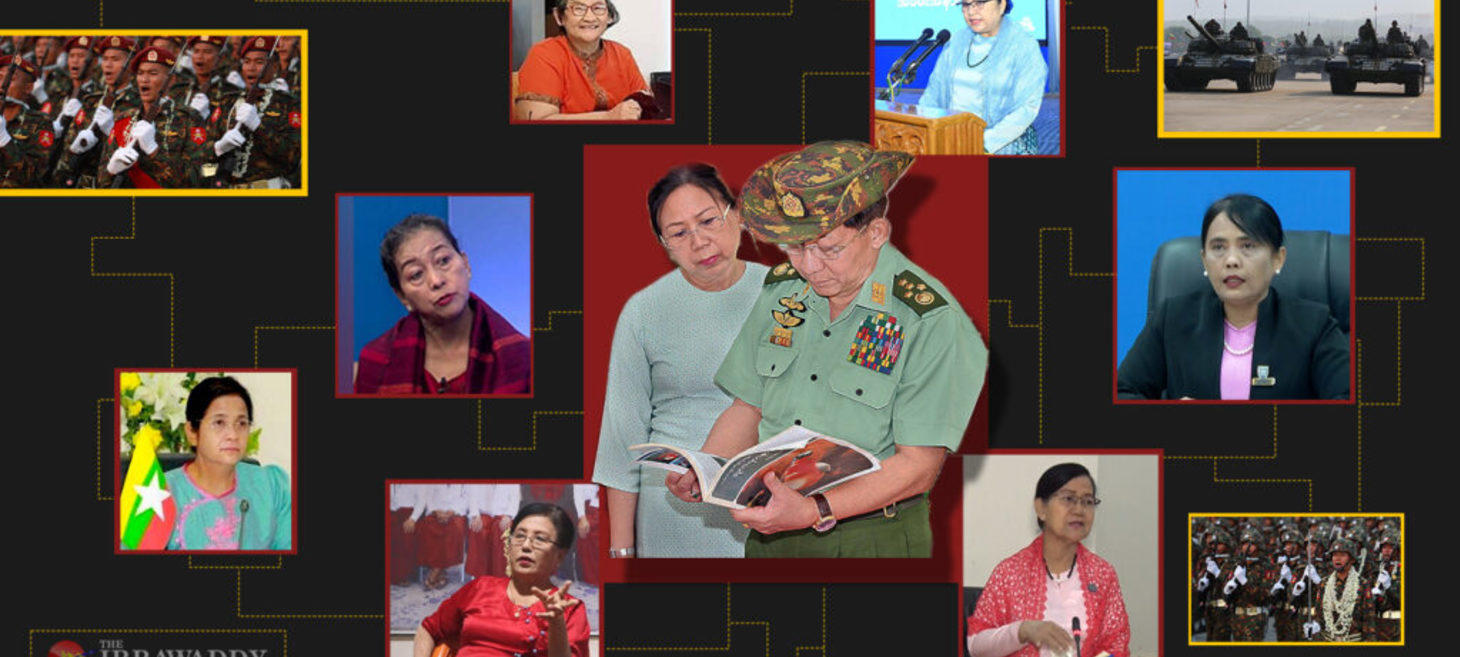
Nine Women Loyalists of Myanmar’s Military Regime
The article detail nine women who hold positions of influence within or provide support to Myanmar's military regime under Min Aung Hlaing. These women include Dwe Bu, an ethnic Kachin member of the State Administration Council (SAC); Aye Nu Sein, an ethnic Rakhine member of the SAC's Central Advisory Board; and advisors Yin Yin Nwe, Nwe Nwe Oo, and Khin Oo Hlaing. Additionally, Thida Oo serves as the Union Minister for Legal Affairs and Attorney General, Nu Mya Zan is the Deputy Minister of Culture, and Than Than Swe is the Governor of the Central Bank of Myanmar (CBM). The article also mentions Thet Thet Khine, who previously served as the hotels and tourism minister and now leads the People’s Pioneer Party, and Kyu Kyu Hla, Min Aung Hlaing's wife, who plays a significant supportive role. These women are described as providing administrative assistance, legal support, financial management, advisory roles, and symbolic support to the junta leader, often leveraging their positions or expertise to bolster the regime's authority and extend its grip on power.
United Nations
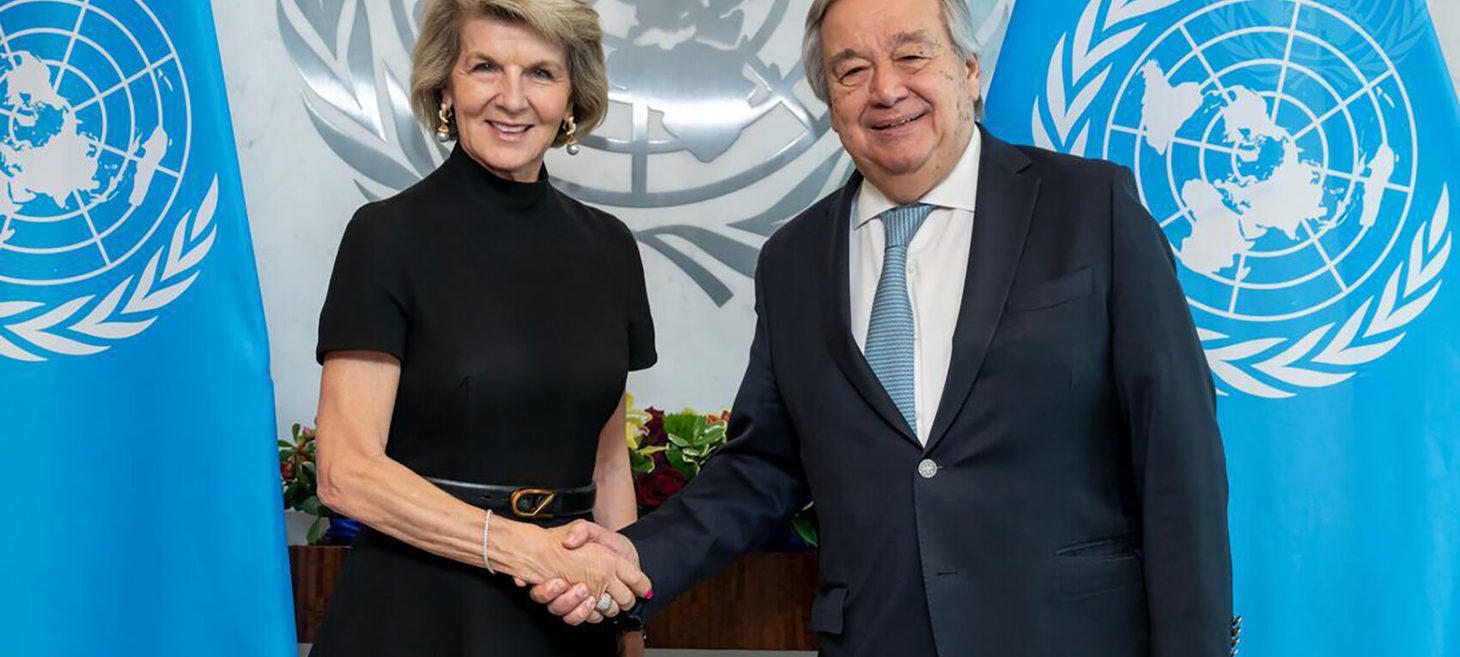
Hundreds of CSOs Demand UN Myanmar Envoy’s Removal Over China Links
Hundreds of civil society organizations (CSOs) have called for the removal and investigation of the UN Special Envoy on Myanmar, Julie Bishop, due to alleged conflicts of interest stemming from her ties to Chinese state-owned companies active in Myanmar. These 290 organizations issued an open letter to the UN Secretary-General and the General Assembly, expressing alarm over Bishop's role as an advisor for Energy Transition Minerals (ETM), which partners with Chinese state-owned entities involved in projects within Myanmar, including rare earth mining and Belt & Road initiatives that reportedly support the military junta. The CSOs argue that these connections compromise Bishop's impartiality given China's significant military and financial support for the junta. While Bishop has denied any conflict of interest, the organizations are urging the UN to investigate these potential conflicts and terminate her mandate, emphasizing the need for the UN to support the Myanmar people's pursuit of peace and democracy.